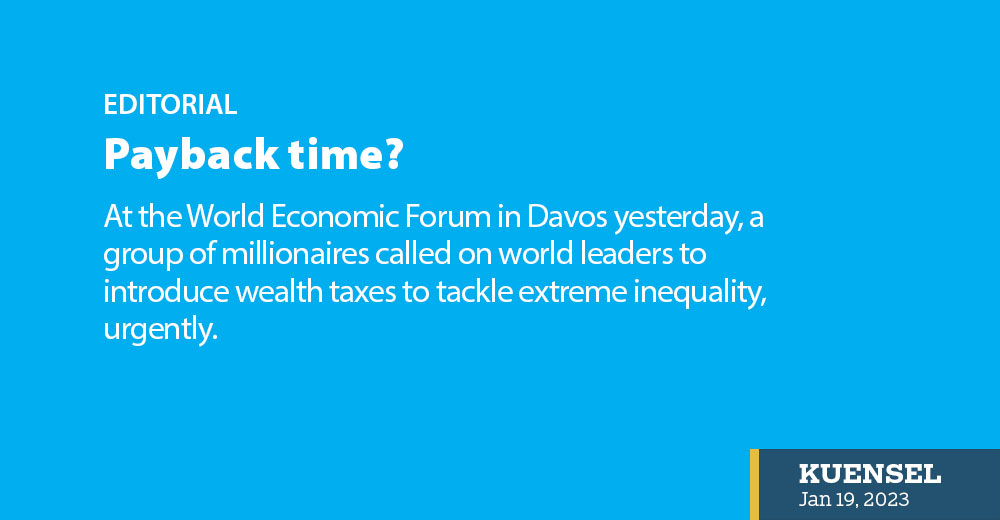At the World Economic Forum in Davos yesterday, a group of millionaires called on world leaders to introduce wealth taxes to tackle extreme inequality, urgently.
Such calls to part with wealth are a far cry. But as we begin 2023, the ultra-rich group recognising the cause of “extreme inequality” and challenging leaders to tax them is a positive sign.
As we begin the new year with apprehension, the group or super rich calling for action to help billions struggling to make ends meet and warning of inaction leading to greater division is one positive sign. This comes at a time when inequality is on the rise.
Closer to home, according to a new Oxfam report, India’s top 1% owned more than 40.5%of its total wealth in 2021 while the poor are “unable to afford even basic necessities.” A 2022 report on Asia’s Extreme Inequality Crisis stated that Covid-19 has exacerbated Asia’s crisis of extreme inequality.
The gap between the rich and the poor in Bhutan is increasing going by the Gini coefficient index, the most common index used to measure income distribution. In 2017, the Gini index rate was 0.38. It was 0.54 in 2022. The higher the Gini coefficient, the greater the gap between the incomes of a country’s richest and poorest people where 0 is perfect equality and 1 represents perfect inequality.
While the gap is not as alarming as in neighbouring India, it is noteworthy. The richest 1% in Bhutan holds 25% of the wealth, according to the Oxfam report. Our rich may not be ultra-rich and willing to call on the government to tax them, yet there are more reasons than parting with their wealth to tax the rich.
Tax is a sensitive topic, especially if it is going after the rich. However, when the country and a larger portion of people are living on borrowings, it is a good idea to consider. It may not happen before an election year, but with the country under transformation, anything is possible and can be done.
It is known that Asia is a region where taxes on wealth and property provide very little revenue. It is 0.4 %of GDP on average, compared with 1.88% in OECD countries. We have introduced the long-overdue property tax. New taxes like wealth tax, inheritance tax or capital gain taxes could help bridge the gap. It is not to punish those becoming wealthier. It is to improve revenue from taxes and, like the Davos group said, help those struggling, including governments.
At home, if the Covid-19 pandemic aggravated the gap, it is time for payback from those who benefited from the pandemic.
For instance, of the Nu 8.817 billion the government refunded banks for monetary measures, the housing sector or loan account holders benefited the most with Nu 2.847B. In other words, those with income from property or the rich benefited the most.
Just two business entities received Nu 36.7M and 34.8M, the highest, with the lowest benefiting by Nu 8.95M – thrice more than what a salaried civil servant would take home in benefits after 34 years in service.


